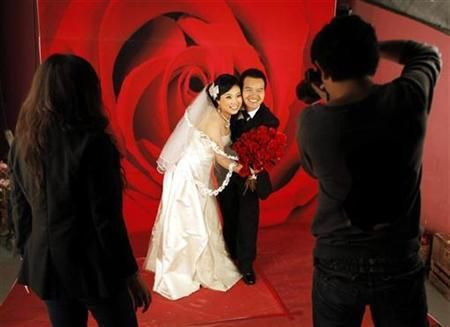China’s Fake Marriages: A Result Of A Nation’s Allegiance to Traditional Values

A well-documented cultural phenomenon of gay men marrying women has sparked a new debate among China’s citizens. The nation’s deeply rooted traditional culture of maintaining a strong family lineage has created a trend of unknowing women marrying gay men, locally referred to as “tongqi.”
The tongqin trend caught the attention of one of China's most influential judicial bodies and issued a report with recommendations on how to handle the growing divorce rate as a result of the faked marriages.
In Chinese history and classic literature, homosexuality was an open subject, even tolerated. Various Chinese literary myths and tales have used same-sex relationships of both genders as a part of storytelling. According to the China Daily newspaper, the earliest mention of a homosexual relationship was documented in the Chronicles of Shang, during the Shang Dynasty (circa 16th century-11th century B.C.).
But despite the cultural heritage of homsexuality in the country, China’s government still does not allow same-sex marriage. In addition to that, most Chinese parents, like other cultures do as well, desperately hold on to dreams of having grandchildren and place the utmost importance on it.
According to an opinion piece by Adam Minter on Bloomberg last month, a letter from a 26-year-old gay police officer coming out to his parents was posted on Danlan.org, China’s most popular community for gay news. His parents, whom he says he has obeyed for his entire life, are insisting he get married, and in another act of submission to them, he will do so. In the letter, he explains that, though he does not want to get married and was never interested in women, he will reluctantly go through with it.
“Last year, you asked me why I didn’t seek out a partner, and we fought. A few days later, you asked if I would agree to let you find a match for me. I did not agree, and at that Mother shed tears and you advised me that you’re old and hope to soon hold a grandson. I stared at your full head of white hair and deepening wrinkles, my heart trembled, and I caved in and agreed to this marriage. I am really forcing myself into a dark place, and you’re smiling ear to ear.”
Minter's piece highlighted that the tongqi marriages also shed light on the current role of women in Chinese society. Forced heterosexual marriages, either by guilt or fear of social prejudices, often trample the rights and opinions of women as well, who often enter these marriages not knowing their partner is gay.
The pressure to get married and bear children is felt by women as well. Some women have resorted to "renting" fake boyfriends to take home to their parents during holiday events as a way to alleviate the family and social pressures to settle down.
The problem here, they say, is not only that there is discrimination against sexual orientation, but also against gender. A Twitter-like Weibo account for the Tongqi Association, a support group for women in these fake marriages, explains that tongqi marriages can be decreased if gender equality were more accepted.
“Even if sexual discrimination still exists, you can reduce the number of tongqi if there is universal respect for women, respect for their bodies and their reproductive rights, so that they are not just taken as reproductive machines in order to continue the family.”
On the other hand, the goal of honorably carrying on a family name through children, which is important in Chinese society, can only really be achieved through these faked heterosexual relationships, because China only allows married couples to adopt, and only heterosexual couples are allowed to get married.
A Qiang, who is actively known on Danlan.org as a blogger and has written extensively on tongqi marriage, summarized his case for the legalization of same-sex marriage as a way to curb these faked relationships.
“The solution to the tongqi problem is ... legislation to allow same-sex marriage so that gay men have the right to live with whom they fall in love.” This will, in turn, possibly mean the legalization of gay couples adopting children, as well.
While many areas of Chinese life have shown signs of change, the deeplyvrooted desire for a traditional family structure is still largely the same. And though increased gender equality and legalizing same-sex marriage will likely reduce these faked tongqi marriages, the fundamentals that caused the problem will still remain. However, the recognition that the fake marriage trend has received from influential Beijing courts suggest that steps toward gender and marriage equality could be in the nation’s future.
© Copyright IBTimes 2024. All rights reserved.






















